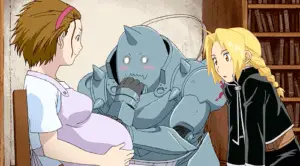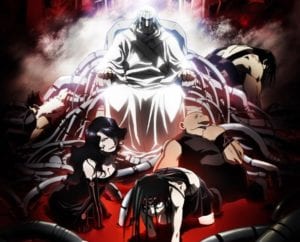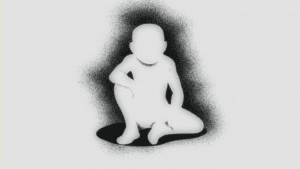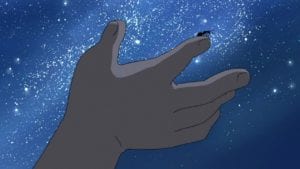Warning: Spoilers
Fullmetal Alchemist: Brotherhood is an anime known for its unique world, fantastic animation, compelling characters, brilliant writing, and insightful themes that leave an impact on its viewers. The story of two brothers trying to reclaim what they’ve lost could have been a simple enough tale, but Hiromu Arakawa riddled her interpretation of this premise with complex themes such as science vs. religion, politics, the effects of war…
But there is one theme she conveys in nearly every breath of her writing. One theme that seems to be the meaning of the story: humanity, and the precious, beautiful simplicity of our existence. Arakawa’s writing is an ode to humanity in various ways, and each element ties her message together perfectly.
Creation

In Arakawa’s world, alchemy is a science that allows the alchemist to reshape matter in pretty much any way they see fit. The ability to do this is given to humans by the Truth, the god of their universe. Alchemy allows humans to step outside of their natural bounds, so long as they have something of equal value to give in return. This is called the law of equivalent exchange, and it is something the Truth seemed to put in place so that humans could not “play God.” By giving humans alchemy, the Truth allows humans to manipulate what has already been created, but not to create something from nothing. True creation is the one thing alchemy could never do, but humans can, and the narrative uses this as a reason to praise humanity. Ed reflects on this when witnessing the birth of a baby:
“Alchemists have worked for centuries, and we’re still not able to do that — a person creating another person. […] It really is awesome. People are awesome.”
Alchemy cannot create life, and when it tries, it results in nothing but abominations. Chimeras are created with alchemy, and the narrative constantly stresses how horrific the concept is, and when an alchemist attempts to perform human transmutation — the act of creating another human via alchemy — it always results in half-formed monsters. Human transmutation always fails because, in order to do it successfully, the alchemist must give something of equal value … but that’s impossible, as there is nothing equivalent to a human soul. Human souls are also the only thing an alchemist can use to bypass the laws of equivalent exchange — that’s how powerful they are. That’s how unique and priceless they are … and only humans can create them.
Arakawa also uses creation as a means to contrast the homunculi with humanity. Homunculi are artificial humans, created and powered by philosopher’s stones, which, in itself, are created with human souls. Homunculi cannot create, only destroy, as Hohenheim tells Father:
“You insist on treating humans as a lower life form, but don’t you see? Only through them can a philosopher’s stone be created, and only through a stone can a homunculus arise, but what does a homunculus produce? What do you create? Creation is all, and you’ve done nothing but destroy. You may think you’ve reached a perfect state of being, but in truth all you’ve reached is a dead end!”
This is one of the reasons why homunculi and humanity are foils, with the narrative portraying homunculi negatively, while praising humanity. Humans create; therefore, we are a worthy species.
Inhuman Antagonists

Every main antagonist in this story is either against humanity, or does something against the natural order, i.e. plays God — all fitting villains for an anime with a strong pro-human narrative.
The human villains were physically so, yet performed inhuman actions. Shou Tucker turned his own daughter into a chimera, so he not only played God and made something the narrative sees as an abomination, but he destroyed the human life he himself created. The treasonous soldiers who sided with the homunculi did it in exchange for immortality, something humans cannot achieve. All of these people went against the natural order, and in doing so, are held in contempt by the narrative.
The true villains of the story are the homunculi, who are dark mirrors to humanity. Father and his children were all made with the blood of Hohenheim, who was human at the time, and they cannot exist without human souls powering them. Excluding Wrath, homunculi are immortal, whereas humans age. They have powers that humans could never achieve.
Because of this, homunculi believe that they are superior to humans. They constantly berate us, belittle us, and show their disregard and outright contempt for human life by committing countless murders to gain power. Father hates humans so much that he removed the seven deadly sins from himself and manifested them into his children. These sins were the only parts of him that made him something like a human, yet he ridded himself of them because he thought it would bring him closer to becoming “the perfect being,” i.e. not human — God. As Father and his children are antagonists, the narrative never lets us forget that they are wrong.
But what’s ironic about this is that while Father hates humans, he wants to be us, or at least have what we have. When he was just the Dwarf in the Flask, nothing more than a black cloud trapped in glass, he mocked Hohenheim for wanting a family, as he claimed it was a silly human thing … and yet as soon as he was able to, he gave himself children. Family isn’t the only human thing Father wants, if Envy’s characterization is anything to go by. It’s revealed by Ed that Envy, one of Father’s children, is envious of humans, despite his claims of superiority:
“Now I see. You’re jealous. You’re jealous of humans, aren’t you? We humans … according to you, we’re supposed to be nothing when compared to homunculi. And yet, when we’re beaten down, when we stray and fall, we face the challenge again and again. Our loved ones are always there to pick us back up. And you’re jealous. You envy us because of that.”
So if Envy, the manifestation of Father’s sin, feels envious toward humans, then it’s fair to say that Father was envious of humans too. I don’t consider Greed to be a villain — especially the second manifestation of him — but it was revealed that what he truly desired was friendship. As he is also Father’s son, it shows that Father also craves friends. Friends, family — they are human things. And he wants it. He wants to be us, but because of his hatred, he tries to be something “greater” than us — the perfect being. The main villain claims to be superior to humanity, and yet he desires what we have — family, the power to create, our unique existence. The narrative portrays Father and his children as wrong, but also right, in a strange way. Father wants to be human, and he is right to. But he is also wrong because of what he believes and does due to his envy for us. The writing of him and his children is yet another element used by the narrative to praise humanity.
God & Mundane Power

Alchemy has a plethora of spiritual and religious themes surrounding it. It was given to the humans by the Truth, who is God. When an alchemist who has seen the Truth performs alchemy, they clasp their hands together, as if they are praying. This imagery conjures the idea that the alchemist is asking the Truth — God —to allow them to perform their alchemy successfully. And the Truth does seem to monitor every alchemy experiment performed, since it immediately summons and punishes those who break its taboos. It took Ed’s leg and Al’s entire body because they tried to bring their mother back to life, and it took Izumi’s internal organs for attempting to resurrect her son. Father was sent to what can be interpreted as Hell because he dared to forsake what little humanity he had and covet the power of God. Basically, the Truth punishes those who outright defy the natural order, particularly humans. Ed, Al, and Izumi learn this lesson well enough, but ironically it is Father who gives us the direct quote on this:
“Humans who would dare to play God must pay a steep price for their arrogance. That is truth.”
The stance of this anime seems to be that humanity has their place in the universe, and God keeps them from going beyond that place. It is never portrayed as a belittling thing, however — it’s written to celebrate our mundane existence. Take a look at this scene:
Here, we see both Father and Ed speaking to the Truth. And the conversations could not be any more different.
When Ed bargains with the Truth to get Al back, he offers his ability to perform alchemy, the thing that allowed him to cross human bounds and play God in the first place.
The Truth then tests him:
The Truth: You’re sure about this? You do realize that you’ll never to be able to perform alchemy again without your portal?
Ed: I’m aware of that. This portal … I know it contains every secret alchemy has to offer. However, it’s also led me astray. […] I became convinced I could solve everything with alchemy. I couldn’t possibly have been more wrong. That was just arrogance.
The Truth: You’re willing to cast [alchemy] aside, to lower yourself to a simple human?
Ed: What do you mean, “lower myself?” That’s all I’ve ever been: just a simple human that couldn’t save a little girl, not even with alchemy.
The Truth asks him again if he wants to give up alchemy forever, and Ed says this:
“Who needs alchemy, when I’ve got them?”
Ed tells God that he doesn’t need alchemy, the means to be more than human, because he is human, and has human needs: his friends and family. And the Truth is pleased by this:
“You’ve done it! That’s the right answer! Good job, you beat me!”
Ed humbled himself and learned of his place in the world, when he hadn’t truly accepted it before. Contrast this with Father, who was arrogant all the way to the end, and was punished dearly for it.
So the Truth rewards Ed for his humility by allowing him to return with Al, and relieving him of his alchemy, making him truly mundane. Judging from this scene, it seems as if alchemy is a test on the Truth’s part — to see if humans will ever see that alchemy isn’t a gift, but a means for them to realize their place in the natural order: mortal, simple, and unique.
One is All and All is One

The anime shows that humanity has their place, but we are all connected to everything, even the Truth (it even refers to itself as the universe and “You,” when speaking to Ed and Father). Ed explains this to Al when Izumi leaves them on an island so that they can learn what the term “one is all and all is one,” means:
“Everything we see, everyone we meet, is caught up in a great unseen flow. But it’s bigger than that — it’s the entire world, the entire universe, even. And compared to something as big as that, Al, you and I are tiny — not even the size of ants. We’re only one small part within the much greater flow, nothing more than a fraction of the whole. But by putting all those ones together, you get one great all. The flow of this universe follows laws of such magnitude that you and I can’t even imagine them.”
This is something Izumi wanted Ed and Al to understand before she trained them in alchemy, because she wanted to ensure they never made the mistake she made with human transmutation. She wanted them to understand that while they may grasp power through alchemy, they are not gods, and should accept and appreciate their place in the universe by not abusing it.
This philosophy is humbling, and stresses that humanity is neither inferior nor superior, but has their place in the universe, despite the fact that we are connected to everyone and everything. With the other elements Arakawa has conveyed in her masterpiece, we can conclude that Fullmetal Alchemist sees that place as a beautiful one, one where humanity is precious and mundane, yet exalted.

